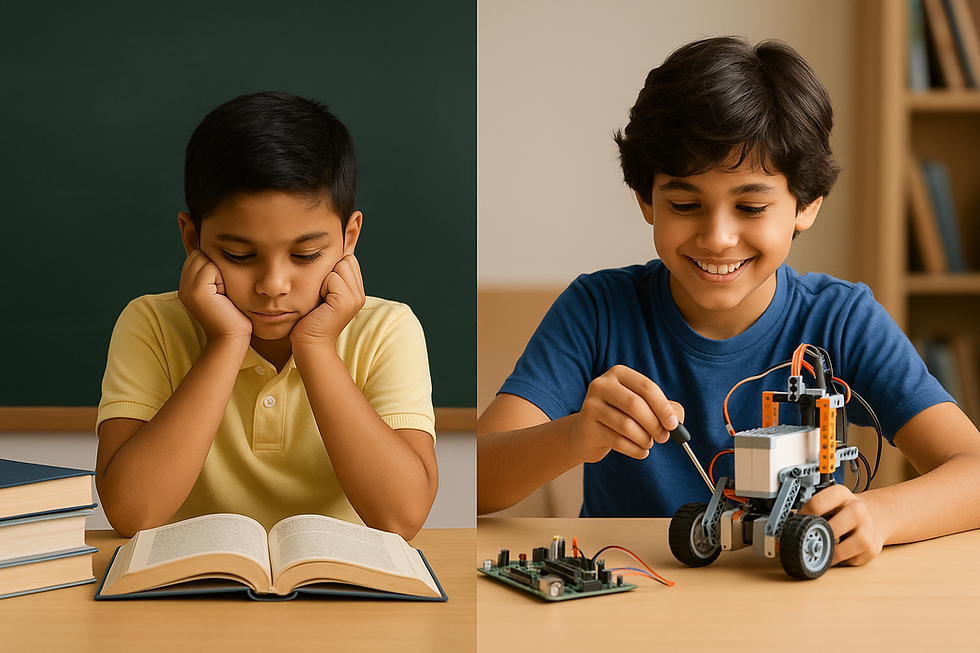Screens and Preschoolers: Finding Balance, Not Battles
- Rohit Malekar

- Sep 11
- 3 min read
A Bengaluru mom once told us: “I gave my 4-year-old the iPad for 20 minutes while I cooked dinner. When I came back, 90 minutes had flown by for both of us.”
Sound familiar? In today’s homes, screen time for preschoolers is less a conscious choice and more like background noise. The question isn’t whether screens exist in our children’s lives. The question is: How do we make peace with them without losing what really matters?
The Problem: Too Many Screens, Too Little Clarity
Research is piling up. A 2022 study in Nature Scientific Reports found that higher screen use in preschoolers was linked to differences in brain structure — thinner cortex in key areas for language and reading. Other longitudinal studies show higher screen time predicting delays in speech, attention, and social skills.
But here’s the kicker: none of these studies are fully conclusive. They tell us there’s a risk, but not that every extra cartoon damages a child’s brain. Meanwhile, in the chaos of daily parenting, advice swings between alarmist headlines (“Screens are rewiring your child’s brain!”) and unhelpful shrugs (“Everyone’s on iPads now, don’t worry”).
Parents are left in limbo; worried, guilty, but still needing screens to survive everyday demands.
The Insight: Not All Screen Time is Equal
Let’s pause and unpack what the research actually shows.
Content matters: A nature documentary or a calm storybook app is different from endless algorithm-driven reels.
Context matters: A video call with grandparents builds language and connection; solo binge-watching does not.
Balance matters: The real harm often comes from what screens replace: outdoor play, story time, family conversations, and sleep.
Put simply: screens are tools, not monsters. They can enrich, distract, or displace depending on how we use them.
The Solution: A Parent’s Compass for Preschool Screen Time
Here’s a framework that parents can actually apply in Indian households:
Anchor Screen Time in Routines
Treat screen time like a treat, not background wallpaper.
Fix a slot, maybe after lunch or before dinner. Predictability reduces nagging and tantrums.
Aim for the World Health Organization guideline: no more than 1 hour/day for ages 2–5. But remember: flexibility > guilt.
Choose Slow, Age-Appropriate Content
Pick shows with gentle pacing, storytelling, and no ads.
Avoid hyper-stimulating reels or violent cartoons. They entertain in the moment but can dysregulate attention spans.
Practice “Joint Media Engagement”
Sit with your child when possible. Ask, “What’s happening? How do you think she feels?”
Pause, rewind, connect back to daily life (“Remember when we went to the park like that?”).
Even 10 minutes of co-viewing can transform screen time into learning time.
Protect the Non-Negotiables
Outdoor play, sleep, and mealtime talk are sacred. Screens should not eat into them.
Watch out for bedtime: screens close to sleep delay melatonin release and keep kids wired.
Model Healthy Habits
Kids copy us more than they listen to us. If we’re scrolling at the dining table, they’ll see that as normal.
Try “device-free zones”: meals, bedrooms, family outings.
Use Screens for Connection, Not Just Distraction
Video calls with cousins, interactive storytelling apps, or music/dance videos you do together.
Handing over a device as the default babysitter should be the exception, not the rule.
Give Yourself Grace
Let’s be real: sometimes you need that cartoon to finish cooking or take a call. That’s okay. The pattern over weeks matters more than one tough day. Parenting isn’t about perfection, it’s about balance.
A Parent’s Checklist
When in doubt, ask three questions before handing over a screen:
Why now? (Am I using this to connect, teach, or just to cope?)
What content? (Is this calm, age-appropriate, meaningful?)
What’s being displaced? (Is this eating into play, sleep, or family talk?)
If you can answer positively to at least two of the three, you’re likely on safe ground.
The SchoolDoor Promise: Parents, Not Algorithms
At SchoolDoor, we believe parents shouldn’t face this alone or rely on fear-mongering headlines. We need a community where moms, dads, and teachers can share what works in homes like ours, with kids like ours. We can swap wisdom, not just worries.
👉 Join the SchoolDoor Early Circle. Share your screen-time hacks, your struggles, your “we caved and gave the iPad” moments.



Comments